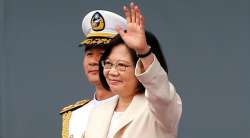Tsai Ing-wen sworn in as Taiwan's first woman president
Taipei:Taiwan inaugurated Tsai Ing-wen as its first female president on Friday, returning the pro-independence Democratic Progressive Party to power amid new concerns over increasingly fractious relations with Beijing and a flagging economy. Tsai too

Taipei:Taiwan inaugurated Tsai Ing-wen as its first female president on Friday, returning the pro-independence Democratic Progressive Party to power amid new concerns over increasingly fractious relations with Beijing and a flagging economy.
Tsai took the oath of office at the Presidential Office Building in the capital Taipei before a national flag and portrait of Sun Yat-sen, the founder of the Republic of China that relocated to Taiwan in 1949 as the communists swept to power on the Chinese mainland.
China claims Taiwan as its own territory and has responded to Tsai’s election by intensifying pressure on the island with military exercises, diplomatic moves and cross-border deportations. At home, Tsai faces an economy that has fallen into a recession as exports have dropped due to sluggish demand.
Tsai’s swearing in was followed by a presentation in front of the office building featuring performers tracing the island’s history from the era of its original aboriginal descendants to colonization by the Netherlands and Japan to the arrival of Chiang Kai-shek’s Chinese Nationalist forces at the end of World War II.
Tsai’s election in January served as a resounding rejection by voters of the China-friendly party that has led Taiwan for eight years.
The polls, which also gave the DPP its first parliamentary majority, were also seen as an expression of concern that the island’s economy is under threat from the Chinese mainland’s economic juggernaut.
Beijing has warned that delicate relations between the sides will suffer unless Tsai explicitly endorses Beijing’s stance that the island and the mainland are part of a single Chinese nation, which it calls the “’92 Consensus.” Tsai has avoided doing so, but has promised not to pursue changes to the current status of de facto independence.